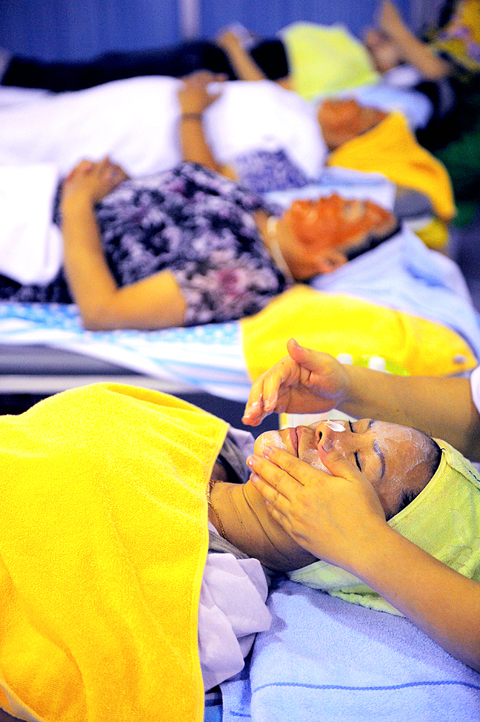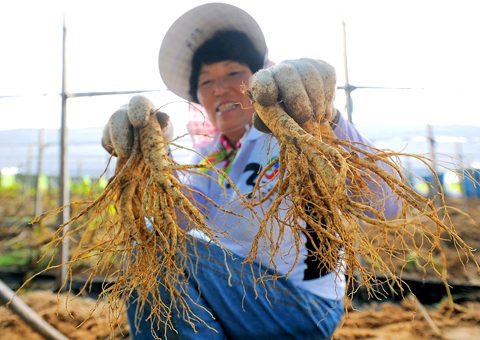“Look! It’s huge!” a muddy, but beaming Han Myung-ja, 52, shouts as she plunges her hoe into the soil to unearth a giant ginseng root.
Han fills a basket with the man-shaped root as she collects seasonal presents for family and friends — one of dozens of people doing the same at South Korea’s biggest ginseng festival.
The herb, known to Koreans as the “root of life” for its purported health-giving properties, grows wild in deep valleys and on shaded hillsides and has also been cultivated on the peninsula for 1,500 years.

PHOTO: AFP
Devotees say the herb increases resistance to stress and fatigue, has an aphrodisiac quality and acts as a stimulant, although it has proved difficult scientifically to prove some of the claimed benefits.
Last year, South Korea produced 27,460 tonnes of ginseng roots, worth about US$700 million including exports valued at more than US$21 million.
Geumsan county, 130km south of Seoul, is the hub of the industry. Its ginseng market operates year-round and accounts for 80 percent of all the country’s trades.

PHOTO: AFP
Geumsan also draws almost a million visitors every year to its ginseng festival, which precedes the major holiday of Chuseok (thanksgiving) at which the root is a prized gift. The event this year runs from Sept. 3 to today.
The festival earned about US$76 million last year, including US$27 million in sales of raw ginseng and US$13 million spent at an expo of various products based on the herb.
“Our county is where ginseng was first found — according to legend — and ginseng here is of good quality due to the nutritious soil and the right amount of sunshine,” county mayor Park Dong-Cheol said.
The event involves a lot more than digging up roots. In a food competition, chefs ranging from soldiers to students are encouraged to be creative.
Among a variety of other dishes, rolls filled with ginseng and vegetables are used to decorate models of traditional Korean homes.
“It looks delicious and beautiful,” Russian visitor Anna Krasnova, 22, said.
Casual visitors can try out various products for free, while traders haggle over large orders at a ginseng expo before signing contracts.
“We sell a lot here. I came last year and I plan to come next year as well because of the large number of visitors,” said Lee Hyo-Jin, who retails ginseng jelly and snacks.
During the expo, more than 150 tonnes of ginseng products are sold daily to both locals and foreigners.
The festival also offers visitors a chance to dig for the roots, a free health examination, ginseng facial masks for beauty, massages involving a form of ginseng aromatherapy and foot baths in water flavored by the herb.
Visitors eager to check their health and receive the appropriate free treatment form long lines.
The festival celebrated its 30th anniversary this year by opening the International Ginseng and Herb Research Institute, a 17 billion won (US$14 million) project with 11 researchers dedicated to proving the health benefits of ginseng and honing cultivation skills.
“We plan to increase the number of researchers to up to 21 in five years and are currently preparing labs for projects,” Park said.
The county says its goal is to make ginseng production scientific and easier for buyers to trace, in a bid to promote the herb more widely overseas.
“Ginseng and Koreans cannot be separated. It is our medicine and our food and we will try to show all its benefits to foreigners through this festival,” Park said.

FREEDOM OF NAVIGATION: The UK would continue to reinforce ties with Taiwan ‘in a wide range of areas’ as a part of a ‘strong unofficial relationship,’ a paper said The UK plans to conduct more freedom of navigation operations in the Taiwan Strait and the South China Sea, British Secretary of State for Foreign, Commonwealth and Development Affairs David Lammy told the British House of Commons on Tuesday. British Member of Parliament Desmond Swayne said that the Royal Navy’s HMS Spey had passed through the Taiwan Strait “in pursuit of vital international freedom of navigation in the South China Sea.” Swayne asked Lammy whether he agreed that it was “proper and lawful” to do so, and if the UK would continue to carry out similar operations. Lammy replied “yes” to both questions. The

‘OF COURSE A COUNTRY’: The president outlined that Taiwan has all the necessary features of a nation, including citizens, land, government and sovereignty President William Lai (賴清德) discussed the meaning of “nation” during a speech in New Taipei City last night, emphasizing that Taiwan is a country as he condemned China’s misinterpretation of UN Resolution 2758. The speech was the first in a series of 10 that Lai is scheduled to give across Taiwan. It is the responsibility of Taiwanese citizens to stand united to defend their national sovereignty, democracy, liberty, way of life and the future of the next generation, Lai said. This is the most important legacy the people of this era could pass on to future generations, he said. Lai went on to discuss

MISSION: The Indo-Pacific region is ‘the priority theater,’ where the task of deterrence extends across the entire region, including Taiwan, the US Pacific Fleet commander said The US Navy’s “mission of deterrence” in the Indo-Pacific theater applies to Taiwan, Pacific Fleet Commander Admiral Stephen Koehler told the South China Sea Conference on Tuesday. The conference, organized by the Center for Strategic and International Studies (CSIS), is an international platform for senior officials and experts from countries with security interests in the region. “The Pacific Fleet’s mission is to deter aggression across the Western Pacific, together with our allies and partners, and to prevail in combat if necessary, Koehler said in the event’s keynote speech. “That mission of deterrence applies regionwide — including the South China Sea and Taiwan,” he

UNPRECEDENTED: In addition to the approved recall motions, cases such as Ma Wen-chun’s in Nantou are still under review, while others lack enough signatures The Central Election Commission (CEC) announced yesterday that a recall vote would take place on July 26, after it approved the first batch of recall motions targeting 24 Chinese Nationalist Party (KMT) lawmakers and Hsinchu Mayor Ann Kao (高虹安). Taiwan is in the midst of an unprecedented wave of mass recall campaigns, following a civil society push that echoed a call made by Democratic Progressive Party (DPP) caucus whip Ker Chien-ming (柯建銘) in January to initiate signature drives aimed at unseating KMT legislators. Under the Civil Servants Election and Recall Act (公職人員選舉罷免法), Taiwanese can initiate a recall of district-elected lawmakers by collecting